- Home
- Eoin Colfer
The Reluctant Assassin Page 2
The Reluctant Assassin Read online
Page 2
Chevie sighed. ‘So it’s back to school for the little kid.’
‘I hate to tell you this, Chevie, but you are a kid,’ said Witmeyer, glancing over Chevie’s shoulder, anxious to shut this meeting down and join the other agents clack-clacking their weapons in the bustling office space beyond. ‘I’m giving you double years for your pension, Chevie. That’s the best I can do. You can take the pension offer or not. Either way, if you want any chance of staying on at the Bureau, you’re going to London.’
So Chevie had been in England for nine months, babysitting a metal capsule that looked an awful lot like an Apollo landing module that had been stuffed into the basement of a four-storey Georgian house on Bedford Square in Bloomsbury.
‘What do we actually do here?’ she had asked her boss on the first morning. His name, believe it or not, was Agent Orange, which must be some kind of alias, and he was grey from head to toe, from his floppy quiff to his sunglasses and his skinny suit, right down to his custom-made tasselled loafers.
‘We attend the pod,’ said the fifty-year-old agent, his Scottish accent making the word attend about three seconds longer than it needed to be.
‘What are we, podites?’ said Chevie, still jet-lagged and feeling a little belligerent.
Orange took the question seriously. ‘In a way. Yes, Agent Savano. That pod downstairs is your church.’
He led Chevie through the lobby area, which was decked out like a three-star English hotel, complete with fire dogs and a ship in a bottle, down into a basement with a reinforced steel door. Once they got past that door, things got real FBI real quick. Chevie spotted over a dozen cameras in the concrete walls, there were motion-sensor bugs all over the corridor, and every type of information cable known to man was threaded through a grey conduit.
‘Nice conduit,’ said Chevie drily. ‘Goes with your . . . everything.’
Orange coughed. ‘Agent Witmeyer did mention that I am your superior?’
‘Negative on that,’ lied Chevie. ‘He said we were partners.’
‘I doubt that very much,’ said Orange. ‘In fact, I am only referring to you as Agent as a courtesy. From what I hear, you’re being stashed in London after the ill-conceived high-school initiative went south.’
They passed a holding cell and a well-stocked infirmary, then the corridor widened into a circular chamber, which housed a ten-foot-tall pyramid-shaped metal pod, covered in refrigeration tubes and complicated groups of blinking lights.
‘This is WARP central,’ said Orange, patting the casing fondly.
‘It looks like a sci-fi Christmas tree,’ said Chevie, doing her best not to be impressed.
Orange checked a number of readouts; it really looked like he knew what he was doing.
‘I was expecting this attitude,’ he said, without facing Chevie. ‘I read your file. Most informative. Graduated top of your special group. Record test scores in spite of your age. Problem with authority figures, blah blah blah, so much so movie stereotype.’ Orange turned finally to Chevie. ‘We both know why you’re here, Agent Savano. Your group was an embarrassment to the Bureau and a potential legal minefield, because of your age. You messed up for the cameras in Los Angeles, so they sent you overseas on a quiet posting, but, in spite of what you may think, what we do here is important, Agent. There shall be no cutting of slack because of your youth.’
Chevie glared. ‘Don’t worry, Agent. I don’t expect slack and I don’t cut any.’
Orange thrust a hand inside the pod, checking the temperature. ‘I’m glad to hear it. It is more than likely that your un-slackened talents will never be called upon. On most days a man probably won’t come out of the WARP pod, so you don’t have to do anything except study for your diploma. But on the off-chance that this very special man does emerge from that hatch when I am out, you need to keep him alive. Just keep him alive and call me. That’s it.’
‘Is the man in there now?’
‘No, Agent. The pod is empty at the moment, and has been for thirty years.’
‘So it’s a magic pod?’
Orange smiled in a way that told Chevie that he knew quite a lot that she didn’t. ‘Not magic, exactly. Magical, maybe.’
‘Yep, that makes a lot of sense.’
‘That’s all the sense you’re going to get out of me today, Agent Savano. Maybe when you’ve proven yourself as a serious podite I’ll share some details. Until then you live on-site, you never stray more than a mile from the house, and I watch the pod while you sleep.’
‘Where do I sleep?’
‘The flat upstairs. You’ll love it.’
‘Where do you sleep? In bonnie Scotland?’
Orange smiled again. ‘The top floor. I get the penthouse. One perk of being the boss.’
He handed Chevie a smartphone. ‘All the numbers are pre-programmed. And there are apps for the alarm and surveillance. You see this alarm-button icon? Don’t press that if you don’t want all hell breaking loose. Got it?’
Chevie took the phone. ‘I got it, Agent.’
‘Good.’ Orange turned back to the pod, his fingers tripping across multiple old-fashioned plastic keyboards bolted on to its surface. ‘If you do well here, keep your head down for a couple of years, then let’s see if we can’t sneak you back into the US without the press noticing. By that time you will be almost old enough to apply for Quantico.’
Chevie scowled at Orange’s grey back. In two years she would be ancient. Almost nineteen.
‘Wow, that would be great. Two years’ babysitting. I am so glad I did all those firearms courses.’
Orange left the pod chamber without looking back. ‘Keep trying, Agent,’ he called over his shoulder. ‘Some day you will say something that is actually funny.’
I hate that guy already, thought Chevie Savano.
Now, several months later, Chevie had lost touch with most of her friends in California, while she waited for some mystery guy to pop out of a space pod in the basement. She hadn’t fired her weapon once, even on a firing range, which made her extremely nervous, and she realized that she was not only talking to herself on a regular basis but answering herself too.
‘You need to stop that,’ she said to herself. ‘People will think you’re crazy.’
Really? What people? It wasn’t as if she had talked to anybody other than Orange for over six weeks. She had even celebrated her seventeenth birthday on her own with a chocolate brownie and a single pathetic candle.
The house on Bedford Square had become like her second home, or maybe her prison. She knew every inch of the building better than she knew her own cottage on the Malibu Bluffs, where she could legally live alone when she turned eighteen in less than a year.
There was one room in the Bedford Square house that she did love, and this was the studio. At some point in the house’s history a dancer had converted a large part of the second floor into a dance studio, complete with a mirror wall and barre. Not that Chevie Savano was a dancer, but she was a gym girl, and it had only taken three weeks of nagging to get Orange to sign off on a few thousand pounds for weights and machines.
On this evening, which was to prove eventful but had started out pretty same-old same-old, Chevie had spent her last stress-free moments for quite some time looking at herself in the mirror and thinking, Girl, where is your life going?
It was hardly a mystery.
You know where your life is going. Do your time watching the pod and hopefully the powers that be back in the US will forget all about Los Angeles and allow you a shot at becoming a real agent. You still have friends in Quantico.
Usually federal agents had to be twenty-three years of age minimum before they could wear the shield, but Chevie had been part of a trial programme to combat the increasing problem of terrorist infiltration of high schools. A hand-picked group of state wards had spent a semester in Quantico, and had then been placed undercover in various schools attended by suspected sympathizers, in a strictly observational capacity. No infiltration, no c
onfrontation. Chevie had spent six months in LA keeping tabs on an Iranian family whom the Feds believed were trying to start a cell in California. The assignment had ended with a public disaster outside a Los Angeles theatre where Chevie had used her training to disarm a drunken teen who’d been threatening the Iranians. Unfortunately the teen had been wounded in the process and the entire fiasco was captured on a camera phone. The hothouse programme was hurriedly shut down and Chevie was whisked off to London for babysitting duty so a senate committee would not cotton on to the fact that the agent involved in the Hollywood Centre Affair was a minor.
• • •
Chevie did thirty minutes of cardio, thirty minutes of core, then shadowboxed in the mirror until her Lycra leggings and vest were dark with sweat. She was in good enough shape to whip the top ten percent of law-enforcement officers anywhere in the world. And she could shoot an apple off a tree at a hundred paces.
Do I look seventeen?
As far as Chevie could see, she looked pretty much the same as she had at sixteen. At five feet six she was a little short for an FBI agent, but she was lithe and fast, with a delicate oval face and the glossy black hair typical of Native Americans.
I am going to get through this assignment, she thought. They don’t get rid of Chevron Savano so easily. There are worse things than boredom.
Which was the last routine thought she was to have for a while. Riley could not for the life of him have described his predicament. Had there been a Bible handy, he could not have testified on it as to whether he was alive or dead. His thoughts were a jumble of fear and confusion, and he found that the tough, stoical core of his spirit, which had kept him going through the terrifying years with Garrick, was totally absent.
His senses were spun together like the muddy streams flowing into the Thames, and he felt an urge to vomit that was somehow in his mind and not his gut.
Is this the pit? he wondered. Has the devil claimed me? He ordered his hand to wave, but nothing happened; or perhaps it did and he could not see it.
It seemed somehow that there was a light up ahead, glowing like a streetlamp. Though Riley could neither see the light nor calculate in which direction “up ahead” lay, he somehow knew these things to be true.
I am about to arrive, he realized.
Chevie stood in front of the mirror and watched her image split in two. For the briefest moment she thought that she had finally gone stir-crazy; then she realized that the mirror had cracked from roof to ceiling.
That’s bad luck for someone, probably me.
Then more cracks appeared, jagged black lightning rents that divided the room into sections.
Could it be an earthquake? Do they have those in London?
The mirror cracked once, twice, a thousand times with a sound like automatic weapon fire. The cracks raced past the edges of the mirrors, streaking across the walls. Chevie finally moved when the lacquered floorboards beneath her sneakers began to splinter and fall in torn chunks through to the hallway below.
“What the hell . . . ?” she cried, picking a safe path to the door.
Overhead the lights flickered, then exploded, showering Chevie with glass and sparks. Through the window, she could see streetlamps exploding all along Bayley Street and around the square itself. Beyond the square the blackout rippled down toward Covent Garden and Soho as though some giant night creature was swallowing chunks of light.
What is happening to the power? Orange will know.
But Orange was out. She was the on-duty agent.
A bulletproof front-facing window cracked, allowing noise in from the outside world. Metal shrieked as cars collided on Tottenham Court Road, and the cry of panicked people rose up into the dark London clouds, which had lost their streetlight underglow.
Whatever is happening, it started here, Chevie realized.
She ran to the wall safe, punched in the code number, and pulled out her Glock 22 in the shoulder holster she wore with an extra strap to pull it tight to her left side for a smooth cross draw. She expertly donned the holster and drew her weapon.
Chevie held the gun straight-armed in a two-handed grip, staring fixedly through the green tritium contrast points of her night sight, hoping that nothing would pop up and force her to shoot.
I don’t even know what the guy looks like who might come out of the pod. If I shoot the witness, they will never let me back into California.
Chevie ran down the upper landing, sticking close to the wall. Around her, bricks grated and plaster fell in chunks.
That chunk looks like Texas, thought Chevie, because you can’t control what the mind throws up.
Emergency lighting blisters flickered on, bathing the interior in industrial yellow light.
Good, thought Chevie. I can see whatever happens, which will hopefully be nothing.
Something else occurred to her.
Agent Orange. He’s probably going to blame me for this.
Chevie rattled her gun and told herself to focus, pulling a tight turn into the stairwell. She made her way carefully down the two flights of stairs. The basement steps before her were relatively intact, but the door had buckled and the central panel seemed to have melted.
What could melt a steel door? wondered Special Agent Savano, and this unspoken question was answered when a bolt of lightning sizzled through the glowing edges of the melt hole and took a good-sized lump out of the wall.
Lightning. Okay.
Chevie realized that she had squatted on her hunkers with her weapon aimed at the door.
That’s right, Agent. You can shoot the lightning.
She gave it a few minutes, until it seemed as though the indoor lightning bolts were over and done with, then hurried down the remaining narrow steps.
There was nothing left of the basement door but its frame; the melted edges had already solidified.
In a move that would have made Cord Vallicose, her Quantico instructor, proud, Chevie dived through the frame, rolled, and came up with her gun pointed down the corridor. She would later realize that the sharp edges of the door had scraped her all down one side, but at that moment she didn’t even feel the scratches.
There was no obvious threat beyond the ruined door, just dust and devastation. The WARP pod itself had broken free of its brackets and was pointing nose-first down the basement corridor. It looked for all the world like a small spacecraft had crashed into the house.
Which would make about as much sense as what is actually happening: a big machine is sucking the juice out of central London.
Chevie swore to herself that when Orange arrived, she was going to hold him at gunpoint until he told her exactly what this 1970s-style pod had to do with witness protection.
The pod usually reminded Chevie of a science museum exhibit, with its retro design and faded metallic finish, but now the machine seemed alive and totally functional, whatever its function might be. The thick power cables at its base hummed and crackled like electric eels, and a dozen light clusters flashed complicated patterns in total unison.
This must be the day the important man comes out of the pod, which is impossible.
“You there, in the . . . er . . . pod,” she called, feeling more than a little silly. “Come out with your hands up.”
No one emerged from the metal pyramid, but a hatch vented gas, then dropped with a loud clang to the floor. Ghostly sheets of steam floated from the interior.
Well, that’s new, thought Chevie, checking with her thumb that the safety on her gun was off.
Inside the pod, orange light flickered, casting weird, shifting shadows on the wall.
There’s something alive in there, Chevie realized.
Riley felt every molecule in his body coalesce, compacting until his senses returned. I am alive, he rejoiced, until the bitter cold settled upon him, and his teeth chattered with a violence that cracked a molar.
His hand still gripped the murder weapon, which was even now lodged in the chest of the murdered old geezer.
> I cannot let go, he realized. My fingers are locked.
Riley tried to take stock of his surroundings, as Garrick had taught him.
He was contained in a metal tank with numerous fairy lights a-flashing on the cold walls.
I have brought this magical gent back to his people with a blade in his body and my hand on the blade. They will see me swing for this.
Escape, his instincts told him. Escape before you are in the dock for murder or, worse, Garrick finds a way to find you.
But the cold held him like a boulder strapped to his back; and Riley knew that, like thousands of street urchins every winter, soon he would sleep and then he would die.
Chevie rose on her haunches, then moved stealthily toward the hatch, keeping her gaze pointed through the gun sights. “Come out with your hands up,” she ordered once more, but again nothing emerged from the pod.
It may have taken three seconds to reach the hatch, but to Chevie it felt like an age. Everything slowed down as adrenaline coursed through her system, stimulating her heart rate, dilating her blood vessels and air passages. She saw sparks tumbling slowly from the conduits and steam clouds seemed to stand still in the air.
Keep your focus, Special Agent, she told herself. There is someone in that pod.
She could hear scrabblings inside.
Was it a dog? An animal?
How do I warn an animal?
Suddenly time sped up again, and Chevie found herself in front of the hatch. Cold radiated through the opening and orange sparks moved unnaturally toward one another, coalescing into something solid.
Am I aiming my gun at a ghost?
But there was something else inside, huddled shivering in the cramped interior.
“Don’t move!” shouted Chevie, using her most serious FBI voice. “Freeze, or I will shoot.”
A weak voice came from somewhere inside the orange cloud. “I am freezing, miss. My word on it.”

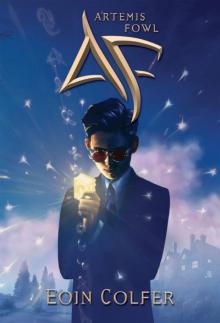 Artemis Fowl
Artemis Fowl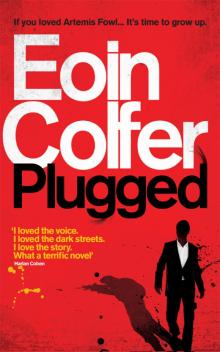 Plugged
Plugged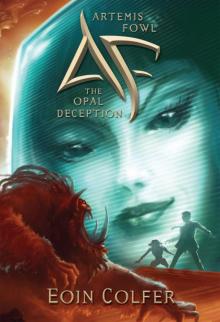 The Opal Deception
The Opal Deception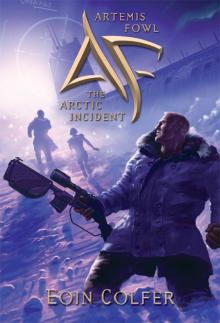 The Arctic Incident
The Arctic Incident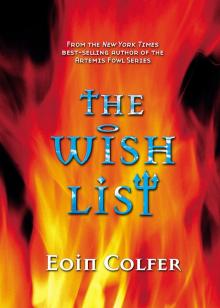 The Wish List
The Wish List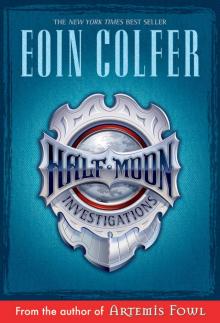 Novel - Half Moon Investigations
Novel - Half Moon Investigations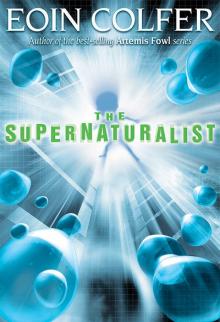 The Supernaturalist
The Supernaturalist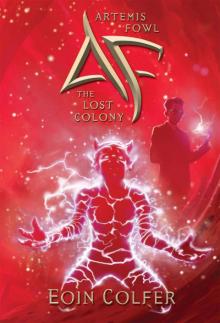 The Lost Colony
The Lost Colony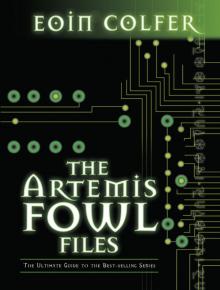 The Artemis Fowl Files
The Artemis Fowl Files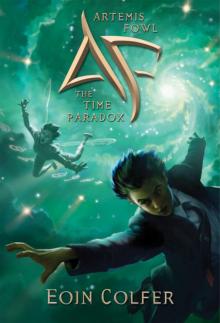 The Time Paradox
The Time Paradox The Atlantis Complex
The Atlantis Complex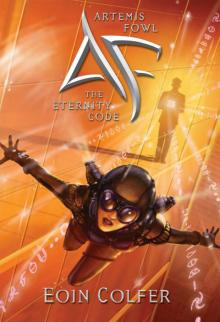 The Eternity Code
The Eternity Code The Time Paradox (Disney)
The Time Paradox (Disney)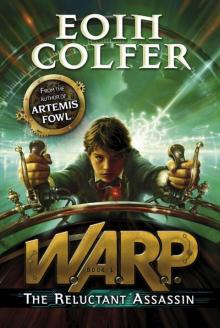 The Reluctant Assassin
The Reluctant Assassin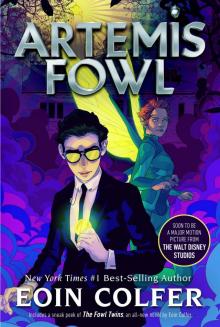 Artemis Fowl (Disney)
Artemis Fowl (Disney) Highfire
Highfire The Last Guardian
The Last Guardian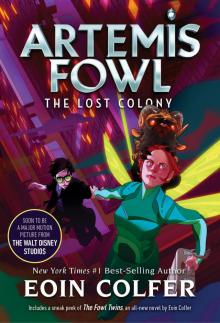 The Lost Colony (Disney)
The Lost Colony (Disney)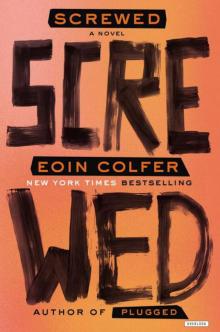 Screwed: A Novel
Screwed: A Novel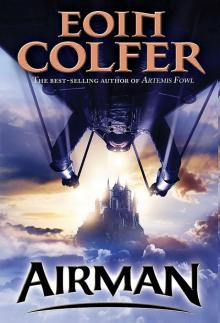 Novel - Airman
Novel - Airman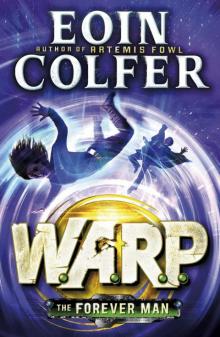 The Forever Man
The Forever Man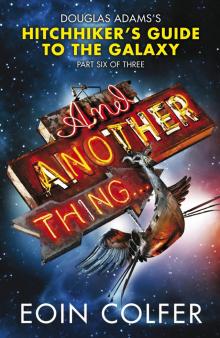 And Another Thing...
And Another Thing...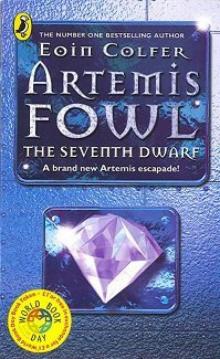 The Seventh Dwarf
The Seventh Dwarf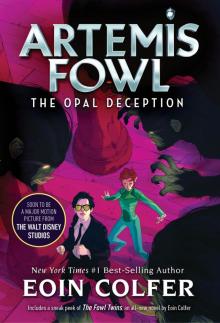 The Opal Deception (Disney)
The Opal Deception (Disney)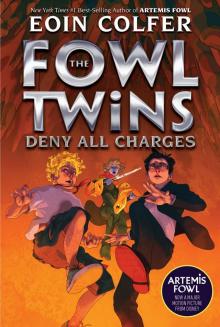 The Fowl Twins Deny All Charges
The Fowl Twins Deny All Charges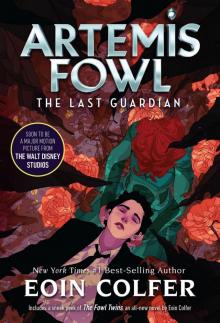 The Last Guardian (Disney)
The Last Guardian (Disney)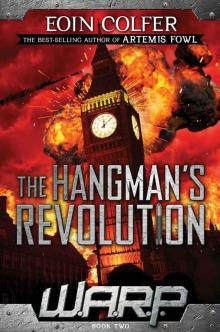 The Hangman's Revolution
The Hangman's Revolution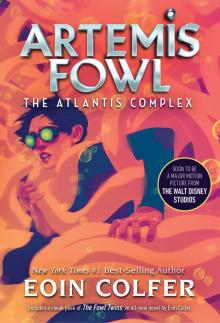 The Atlantis Complex (Disney)
The Atlantis Complex (Disney)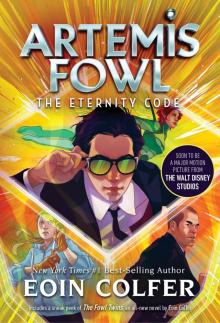 The Eternity Code (Disney)
The Eternity Code (Disney)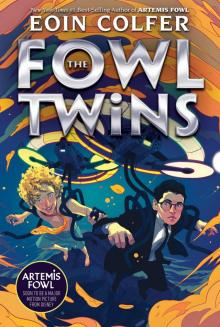 The Fowl Twins
The Fowl Twins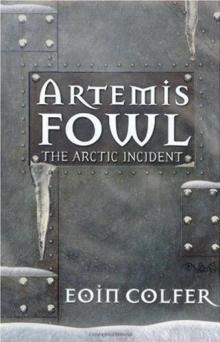 Artemis Fowl. The Arctic Incident af-2
Artemis Fowl. The Arctic Incident af-2 Artemis Fowl and the Atlantis Complex af-7
Artemis Fowl and the Atlantis Complex af-7 Artemis Fowl. The Opal Deception af-4
Artemis Fowl. The Opal Deception af-4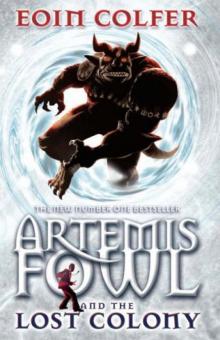 Artemis Fowl. The Lost Colony af-5
Artemis Fowl. The Lost Colony af-5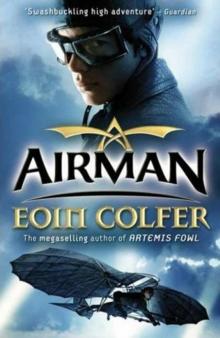 Airman
Airman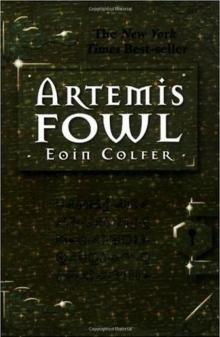 Artemis Fowl af-1
Artemis Fowl af-1 Artemis Fowl: The Eternity Code af-3
Artemis Fowl: The Eternity Code af-3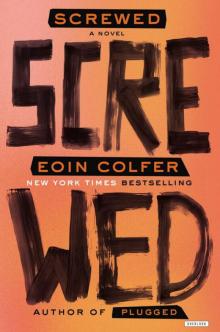 Screwed dm-2
Screwed dm-2